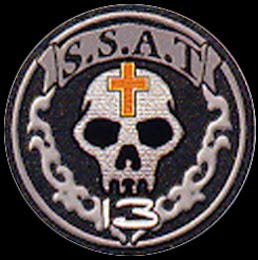The Olympus Police Department
The rank and file cops of the Olympus Police Department are the backbone of order in Olympus. They respond to crimes in progress, patrol the streets, and investigate crimes. They lack the training and resources of the higher organizations, but they don't need them. The average cop never has to draw his gun in the line of duty anyway.
Police, Patrolmen, Officers and Detectives function in the same way and serve the same functions as in the real world. Police have the power to make arrests and enforce the law. It typically will take 1-5 minutes for the police to respond to any call at any given time at any place in the city. Police get around by car, bike, motorcycle, and on foot.
Air Police
The Olympian Air Police consists of several squadrons of helicopter, plane, and hovercraft pilots who act as back up to other law enforcing bodies. They are a subdivision of the standard law enforcing body, and fall under the same jurisdiction. Air Police generally are not used except in the most extreme hostage situations, and in hostage and augmented criminal cases.
SWAT

SWAT functions as the police strong-arm against hostage takers and violent situations that need to be diffused quickly. They have a good reputation compared to similar organizations in other countries, but cannot compare with the likes of GSG-9, GIGN, and ESWAT. In fact, ESWAT looks down on them as incompetent children. However, the fact that most ESWAT agents are headhunted from SWAT cannot be overlooked. They are generally used to suppress the "day-to-day" acts of terrorism that ESWAT does not have the time for.
Special Investigations Unit
The Special Investigations Unit is an organization seperate from the OPD, though it is still headed by the Ministry of Internal Affairs. They are the "FBI" of Olympus (though they should not be confused with the FBI); they are responsible for investigating criminal activity that stems outside of Olympus. They have several subdepartments, each which investigate and respond to different offenses. They work to stop smuggling of contraband materials in and technology out, to fight the drug trade, and to investigate foreign involvement in local crimes.
ESWAT
ESWAT is Olympus' premier paramilitary group. It serves as the anti-terrorist, cyborg crime response, and special force branch of the Central Management Bureau. It is not a police organization in the sense that it is not used to enforce local law: rather, it is used to enforce international law and to keep peace. E-SWAT is an extremely well trained combat force, and can easily take on the toughest of opponents with relative ease.
Recruitment
ESWAT operatives are handpicked from SWAT, SIU, badside "immigration candidates", and, if they get lucky, FBI. Solos and foreign combat personal are often headhunted from badside and other nations to work on ESWAT. These individuals soon find themselves working in law enforcement, or in manual labor.
Training
The life of the ESWAT agent becomes his training. Prospective and veteran operatives alike are put through brutal, strenuous training at ESWAT's huge arcology in the Central Olympic Block. They train 8 to 10 hours a day, with little let up. Every possible scenario is simulated, and after they are all simulated, they do it all over again. No one overspecializes; this breeds weakness. If a character joins ESWAT, he can expect to be spending most of his time in training, when not on an operation. While this limits the character's free time, they'll make a lot of buddies (or enemies) on their team. It's always good to have drinking buddies who are armed (or is it? *hick*).

Training consists of 10 day excersizes in various fields. Common excersizes include defense of government property and officials, cyborg crime, hostage situations, landmate operations, room clearing, and assassination.
Training should most definitely be roleplayed from time to time. This is an excellent tool by which to teach the rules system to the players without having to worry about death (as much). It'll make those deadly black ops that much easier. It will also cement the characters together in a coherent group, and it can be used to create conflict between PCs and NPCs.
Operations and Procedures
The majority of ESWAT missions involve special-forces actions and anti-terrorist operations. Both are compromised primarily of tactical assault, and at this activity, ESWAT is the best in the world. Their training and teamwork really pay off, and the mission fatality and injury rate is lower than those incurred in training. A lesser function exercised of ESWAT is the use of standard police and SIU investigative procedure and assault tactics in bringing in dangerous cyborg criminals too tough to apprehend with normal police units.

ESWAT will often operate in other countries, often loaned to these nations by Olympus to put down terrorists, criminals, and insurrections. However, often they will operate in other countries to protect their own interests. ESWAT will only do so if authorized to do so by the sovereign government (authorization is often aquired just moments ahead of time) or under the cover of plausible deniability. In such circumstances, operatives have a lot more freedom in their actions (though reckless behavior will lead to pay cuts or suspensions). Still, agents have to be careful what they do. The Ministry of External Affairs has ESWAT investigated routinely. At any given time there will by half a dozen FBI moles in ESWAT.



No comments:
Post a Comment